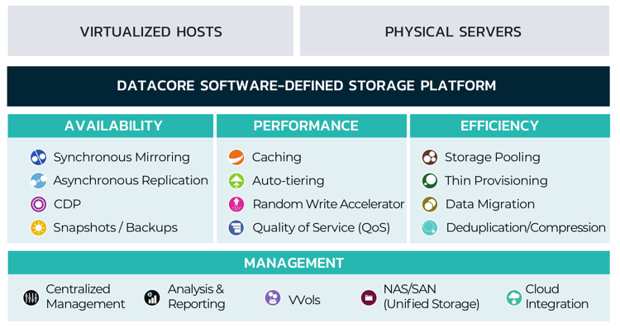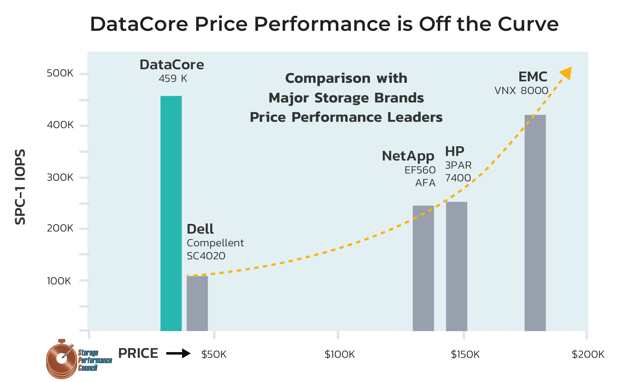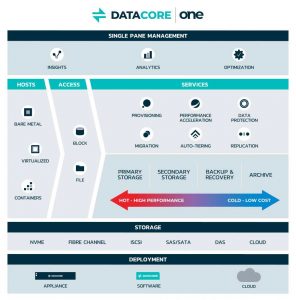DataCore Assigned Patent for Performing Parallel I/O Operations
SDS technologies result in immediate performance improvements across storage systems, data request scheduling.
This is a Press Release edited by StorageNewsletter.com on October 29, 2019 at 2:44 pmDataCore Software Corp. has been awarded a patent as part of a set of related applications covering techniques for improving I/O performance on a multi-core system.
When combined, these patented technologies enable the company’s SDS products to deliver performance improvements across all existing storage systems.
Customers do not need to replace hardware, or undergo any tuning, workload-specific setup or migration; they install the software and storage becomes faster. This level of speed and simplicity is reflected by the nearly 80% of the company’se customers that report up to 10 times faster storage performance, as well as DataCore’s standing as SPC-1 World-Record holder for price-performance in storage systems.
The patented technologies are also expressed in the company’s Parallel I/O technology, which enables users to unlock the full performance of multi-core servers with the firm’s SDS. Many hypervisors and OSs treat I/O serially, even though workloads are scheduled to run in parallel across several CPUs. Instead of waiting on one serial process for I/O, which creates a significant bottleneck, Parallel I/O enables I/O to be processed in parallel-resulting in the need for fewer servers, applications that run 10 times faster, systems that respond quicker without adding hardware, higher workload consolidation ratios with more VMs per server, and decreased costs and complexity.
“Our unique technology expertise has enabled DataCore to create a world-class SDS platform that delivers greater I/O throughput, with better and more deterministic latency, while using less resources,” said Nick Connolly, chief scientist, DataCore Software. “It’s technical innovations like these that elevate DataCore from being just a provider of storage virtualization into the authority on SDS.“
A storage solution based on commodity hardware, such as the company’s SDS, can take advantage of improvements in the underlying platform. Moore’s Law projects that the number of transistors on a chip will double every year or two. This traditionally has meant faster CPU clock speeds and faster applications as a result. However, in recent years, CPU clock speeds have been reasonably static and Moore’s Law has instead driven the development of multi-core chips with massive parallelism. A single chip can now contain more than a 100 logical CPUs, and a system may contain up to four chips. This changes the way software needs to be developed.
Since its inception, the company has targeted multi-CPU hardware and has expertise in this area due to its heritage in real-time and symmetrical multi-processing. However, there is a vast difference between algorithms that perform well with a few CPUs and the techniques that are required to enable hundreds of logical processors to handle millions of I/Os per second with microsecond latency. To address this, the firm has developed a number of techniques to maximize performance, while maintaining the required level of consistency.
All of the company’s technology innovations ultimately support the DataCore ONE vision for storage infrastructure, designed to accelerate the adoption of SDS in enterprise data centers, the cloud and edge computing. This is achieved by centralizing command and control of different classes of storage spanning primary, secondary and archive storage.
Resources:
Video: Serial vs. Parallel I/O Processing
Waiting on IO: The Straw That Broke Virtualization’s Back WP (registration required)
WP Eliminate Performance Bottlenecks: Why Parallel I/O & Moore’s Law Enable Virtualization and Software-Defined Data Centers to Achieve their Potential (registration required)
Read also:
DataCore: Analytics Service, Flexible Hyperconverged Appliance, New Capabilities in SDS
Unifying primary, secondary and cloud storage under single management plane with predictive insights to optimize performance and costs [with our comments]
July 9, 2019 | Press Release

















 Subscribe to our free daily newsletter
Subscribe to our free daily newsletter

